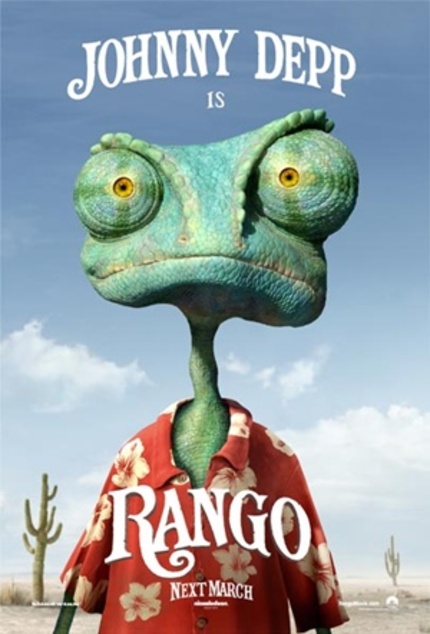RANGO: Twang Goes My Heart (Review)

The opening scenes mark Rango as a distinctly different type of big-budget animated beast. After the twangy opening chords are strummed and an owl introduces the tale, we're introduced to the title character, a lizard (voiced by Johnny Depp) acting out a series of scenarios with assorted objects of amusement.
It's odd and more than a little surreal, simply because we have no idea how this fits into the story. And I'm not going to spoil it by telling you. But Depp gets to exercise his voice for a variety of characters, all within a few minutes, and it's delightful and weird.
Some time later, we arrive at the setting for the bulk of the film, a town called Dirt. Located in the middle of a parched desert, the town is dying because of a lack of fresh water. The lizard ends up in a bar, surrounded by mean, ornery-looking Western-type animals, and on the spur of the moment decides to reinvent himself.
Until then, he's been a friendly, insecure sort of bumbling fellow, but with a self-injected shot of braggadocio, he becomes the fearless Rango, the killer of seven men with one bullet, and is soon anointed as the town's sheriff. He becomes somewhat blustery, but remains determined to solve the mystery of the town's dwindling supply of fresh water.
Rango takes its cues from any number of Westerns; there are obvious nods to Sergio Leone, John Ford, Howard Hawks, and Fred Zinnemann (High Noon), but there are also quick winks to Depp's own filmography (early on, there's a quick reference to Fear and Loathing in Las Vegas), The Wizard of Oz, and, more essentially, Chinatown, which also explored the importance of water to a growing community.
Depp and director Gore Verbinski collaborated on the first three Pirates of the Caribbean films, and there is a degree of free-range chaos on display in Rango as well, but it seems to be reined in by John Logan's screenplay and the requirements of an animated film. I've never had much interest in Verbinski's previous films, which include The Mexican and the American remake The Ring; they've felt like anonymous studio projects.
The difference with Rango are the digressions, both visually and in a narrative sense. It's very much an adventure oriented toward adult viewers, as opposed to a "cartoon" targeted at kids. No question that younger viewers will enjoy the flick, but clearly the filmmakers are mostly concerned with telling a good, sometimes sprawling story than with pleasing the taste of the pre-adolescent set.
Johnny Depp gives a virtuoso audio performance. He's been successful at undermining expectations for years, and here he has the freedom to play around with his character's voice; nearly every line reading is different.
And, mercifully, the rest of the performers have been cast for their vocal abilities rather than their "name," which means that Ned Beatty, for example, sounds different here as the Mayor (basically, the villain) than he did in Toy Story 3 as Lotso (basically, the villain). Isla Fisher also gets to fool around with distinctive vocal characteristics for Beans, a strong Western woman with an eye for Rango, and other voices includes those of Alfred Molina, Stephen Root, Ray Winstone, Harry Dean Stanton, Bill Nighy, and the great Stephen Root.
The film does dawdle at times, and nearly runs off the rails entirely in the final third. It probably takes longer than needed to wind everything up, but the slower resolution allows for a couple of lovely sequences that are among the film's best.
Rango pays respect to Westerns, but forges its own trail. It may be a big-budget studio production, but it has a weird little heart beating inside.

Do you feel this content is inappropriate or infringes upon your rights? Click here to report it, or see our DMCA policy.






